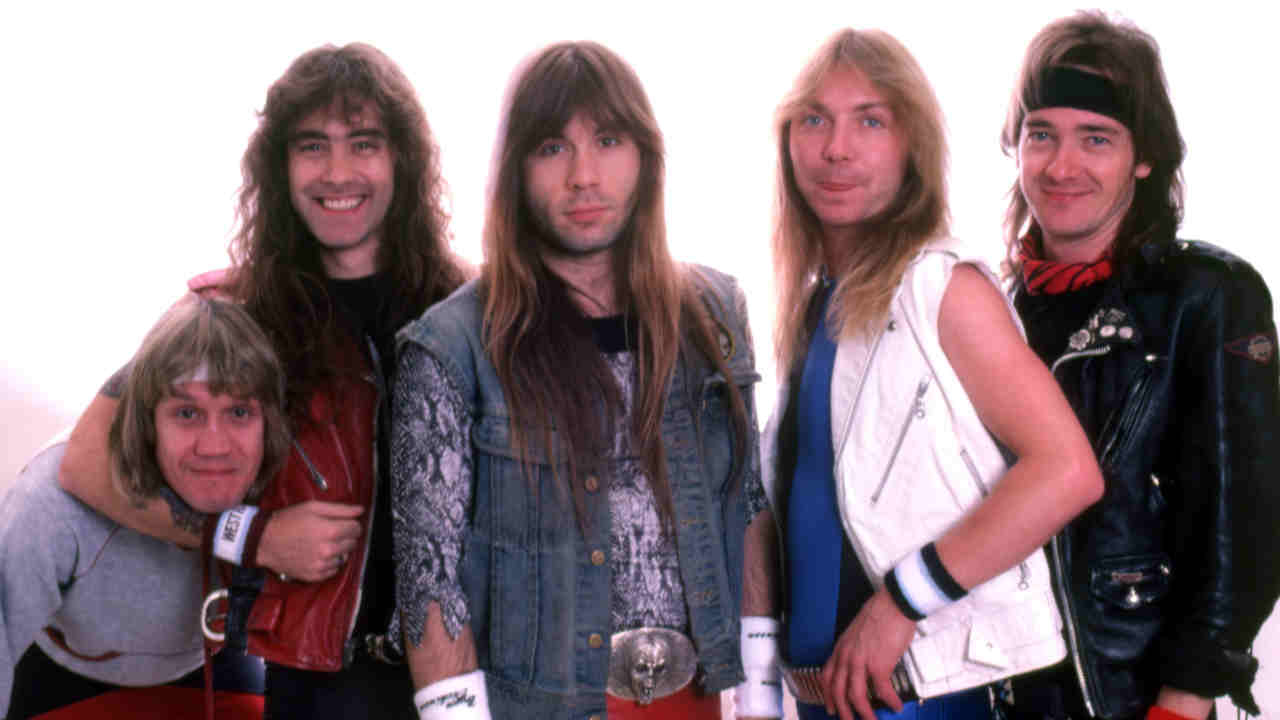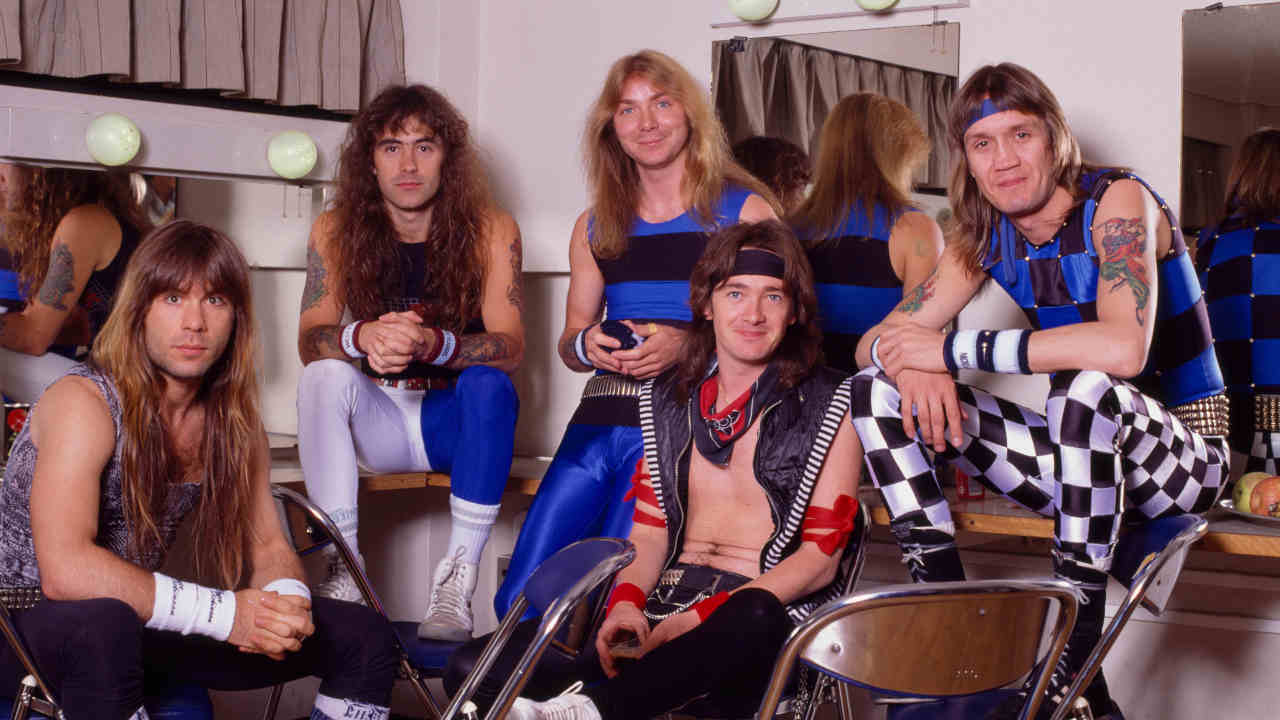
Iron Maiden’s rapidly growing success across their first four albums was matched only by the churn of members. Between 1980’s self-titled debut and 1981’s Killers, guitarist Dennis Stratton was replaced by Adrian Smith. The following year, vocalist Paul Di’Anno was out, as Bruce Dickinson came in for The Number Of The Beast. Then it was the turn of drummer Clive Burr to be given his marching orders, with Nicko McBrain arriving for 1983’s Piece Of Mind. While the ever-shifting line-up didn’t hurt Maiden’s momentum – or their album sales – McBrain’s arrival brought some much-needed stability.
“We had done a world tour to bed Nicko into the band,” says bassist and found Steve Harris. “Obviously the bass player has to work very well with the drummer. So yeah, maybe it did create some more confidence.”
That confidence would bleed into 1984’s Powerslave, Maiden’s fifth album in as many years and the first to feature the same line-up as its predecessor. They were on a creative roll too: where their first two albums had consisted of songs the band had written during the years on the London club circuit, from The Number Of The Beast onwards they’d set aside time to focus on coming up with new material.
“We have no clue what we’re gonna write for any album – there are no leftovers or parts of songs lying around,” reveals Steve. “It’ll all be totally fresh and come out of that next designated writing period, because we never write on the road. We never come up with a direction for an album. We just write a bunch of stuff and see what comes out.”
“It was all random,” adds Bruce Dickinson. “It always is, although no one ever believes me when I say it. I make my lyrics as visual as I can because I think that way. I visualise every lyric when I’m writing it and, truth be told, I sing in pictures too – as I sing I see the picture in my mind of me standing on the deck of a bloody great boat in Rime Of The Ancient Mariner or the dogs of war in 2 Minutes To Midnight. I write in my own little world, then bring it forth on the page in the form of a lyric.”

In many respects, those two tracks represent the two diametrically opposed poles on planet Maiden. Whereas 2 Minutes To Midnight was a sharp, snappy single (the 10th of the band’s career) and reached number 11 in the UK charts, Rime Of The Ancient Mariner is an epic, based on Samuel Taylor Coleridge’s darkly foreboding late 18th-Century poem. It’s also, at just a touch under 14 minutes, the longest song the band had ever recorded to that point.
“This was Steve’s mad idea,” explains Adrian Smith. “In those days we used to head off to Jersey, to record things in this studio we rented as a bunch of tax exiles, basically. It was usually fucking horrible winter weather, I might add. Anyway, we had this system whereby we’d each come up with our ideas, then work with whomever to fill them out. Like I would often work with Bruce on lyrics to my songs or Davey on harmonies and guitar parts and that. Steve usually works on his ideas alone, and when they’re kind of 90 per cent done he’ll present them to the band. That presentation, if you like, was always at the end of the day in the main communal area, like a ‘show and tell’ at school!
“But when he put …Mariner forward I just knew we had to do it, because I’d never heard anyone do anything like it before. I think when we recorded it in the Bahamas he had to hang the lyrics from the top of the wall all the way to the floor, there were so many. And Steve was so fired up about it he convinced everyone else. It’s so dramatic how can you not like it?”
Typically, Steve is a lot more down-to-earth when discussing the genesis of this remarkable piece of work.
“I don’t know where it came from, actually,” he confesses. “I wrote most of it in the Bahamas where we recorded the album. I had an idea back in Jersey, but really it was at Compass Point Studios where it all came together. The funny thing is, no one actually thought it was 13 minutes long at all. We were all so into making it work, and we all enjoyed it so much that we thought it was only eight or nine minutes long, maximum. When our producer Martin Birch timed it at 13 minutes we were all like, ‘Fuckin’ ’ell, 13 minutes?!’ And when we play it live, it never seems like 13 minutes at all.”
Aside from Steve Harris and Dave Murray, there was another key constant within the Maiden team. Martin Birch had been the band’s producer ever since he came onboard for Killers, and was an integral part of capturing their instantly recognisable sound.
“Deep Purple are my favourite band,” admits Adrian, “so when Martin [who’d worked a lot with that band in the 1970s] came in to do Killers, I was really very nervous about him because I thought he’d think I was just plain shit. I mean, this guy had got the best out of Ritchie Blackmore and recorded the In Rock album and all that. So what was little ol’ Adrian Smith gonna do to impress him? But Martin understood where Maiden wanted to be; he did get the best out of people and he was a lynchpin in bringing out all those ideas, enabling us to make records that sounded so strong.”
“Martin was comfortable to work with,” adds Steve. “We knew each other very well by that point. But he never arranged anything; we’ve always done all the writing and arrangements. Martin was there to capture it.”
The band had first used Compass Point Studios for the Piece Of Mind album, having previously recorded in the rather less exotic surrounds of London for their previous three releases.
“We had so much fun doing Piece Of Mind out in Compass Point we had to go back,” says Steve with a laugh. “That, and tax reasons!”
One of the great strengths of Powerslave is that it’s a very visual record. While it can never be called truly conceptual, nonetheless the band’s ability to tell stories reached a new level, as they explored the supernatural (Rime Of The Ancient Mariner), the Battle Of Britain (Aces High), the end of the world (2 Minutes To Midnight) and even an Egyptian theme on the title track, one that was reflected in the album cover as well, featuring another remarkable painting by Eddie creator Derek Riggs.
“Bruce came up with the Powerslave concept,” says Adrian. “He’d done the Piece Of Mind tour with this horrible little Japanese four-track demo machine full of ideas, riffs arrangements and whatever, and the Egyptian thing was on there. Everyone he spoke to about it was really taken by the theme so that’s where we went.”
But Steve denies that there was any great Maiden gameplan involved.
“Total coincidence – nothing preordained or pre-agreed. When it comes to doing a Maiden tour, though, we always want to have a purpose or a theme to it, so that’s where album art comes out in order to make a show. I’ve never had a problem putting on a big show; I don’t understand it when bands don’t put an effort into the stagecraft or put on a show. Four blokes who look like they got changed in the khazi before they got out onstage don’t interest me. If you’re going to put on a show, make it a bloody good one, that’s my view, so that people will remember it.”
The album also features one other curio – Losfer Words (Big ’Orra). It was the first Maiden instrumental since Transylvania on their debut album, and is also their last one to date.
“We just didn’t have any words for it,” claims Steve. “But when we listened to the track it seemed a shame to put words on it, the melody was so good. You never know, we might record one for the next album. Like I said, we don’t have any set rules – we just go with the flow.”
“Losfer Words? Yeah, literally,” laughs Bruce. “We’d run out of lyrics and were really struggling to come up with an idea to fit the music. Someone just said, ‘Do we need it?’ And I thought, ‘No, we don’t. It’s great as it is.’”
Powerslave was released in September 1984, reaching number two in the UK charts and number 21 in the States. The subsequent tour was easily the most lavish and adventurous of the band’s career so far, propelling Maiden to the next level and producing the landmark Live After Death album and concert movie.
But the tour did take its toll on some members. Bruce Dickinson subsequently admitted that he considered quitting the band after suffering from exhaustion. “I did think about that, yeah,” he told Loudwire in 2017. “I was just very, very mentally exhausted by the whole grind, if you like – of grinding out 13 months on the road with no stable social life of any description.”
Bruce stayed, of course, but In many ways, Powerslave marked the end of a chapter for Maiden. Their next album, 1986’s Somewhere In Time, scaled back the grandiosity slightly, bringing sequencers and guitar synths into the mix. Yet it also pointed the way forward too – 1988‘s conceptual Seventh Son Of A Seventh Son brought the prog-metal undercurrent that swam beneath Rime Of The Ancient Mariner to the surface, an approach they’ve doubled down on their most recent albums.
Today, Powerslave remains the album of choice for many Maiden connoisseurs. In subsequent years, they’ve matched its grandiosity - but they’ve rarely bettered it.
Originally published in Metal Hammer 182







